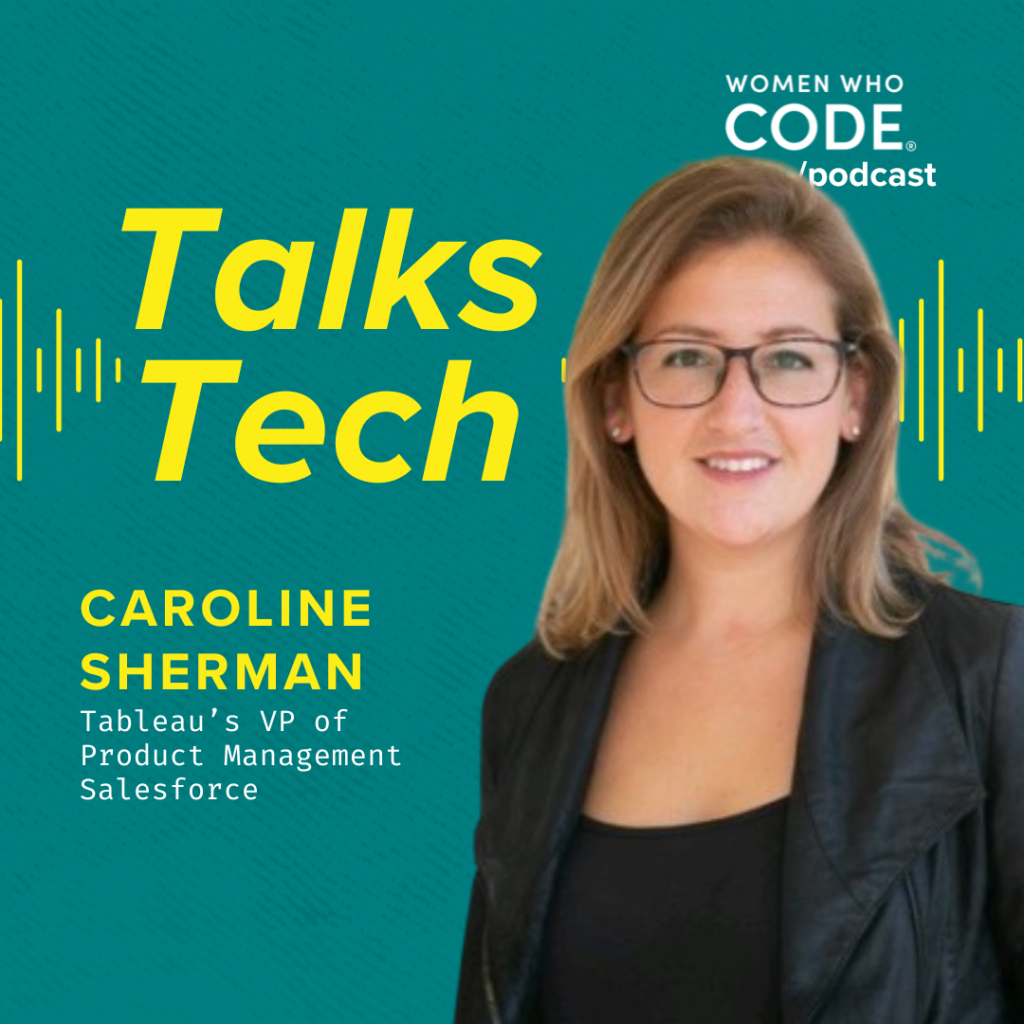Talks Tech #54: How Data Analysts Can Employ Generative AI
Written by Caroline Sherman

iTunes – Spotify – Google – Video – More Episodes
Lindsey Robertson, Women Who Code Leadership Fellow for the data science track, sits down with Caroline Sherman, VP of Product Management, in Tableau’s AI and machine learning space. They discuss how data analysts hold the power to employ generative AI across every facet of organizations and shift data from a business resource to a business essential. Caroline also shares some insights on how her company drives cutting-edge solutions that enable data analysts to do their jobs better.
How did you start as an analyst for the US treasury and work your way into product management?
I often joke that I’m a bit of a career mutt. I almost went to a conservatory for music instead of college, and I ended up studying math. I had a lot of interests. I had no idea where I was going to end up. My first job out of college was actually on Wall Street. I was doing quantitative investing at Goldman. I ended up there just before the financial crisis. I was there for almost four years. That’s kind of what led me to the US Treasury working on post-crisis regulation. I was working on identifying threats to national financial stability. When I left there, I went to business school, and I honestly did not know the path for me. I talked to anyone who would listen or would be willing to talk. I tried to hear where there were opportunities to do some of the things I liked doing. I was encouraged to try product management in tech. That’s how I ended up in product management from the US Treasury, which sounds so unrelated on the surface.
How technical did you have to get through your experience as an analyst and then shift into product? Was this something that you spent years coding and learning how to do things like that, or is it just shaping your softer and leadership skills?
A little bit of both. The skill that was most important for me was the skill of mastery. I heard this thing that said, “Don’t worry about the first job you take out of school; don’t worry about what the thing is. Just worry about learning how to master it.” Mastering things and learning to do whatever I was doing well right in front of me opened new opportunities. By mastering things, you’ll develop many skills that turn out to be useful.
What is important for analysts to prepare to get into the analytics field?
It’s going to be increasingly powerful and exciting to be a data analyst. You’re going to spend less and less time on governance, data cleaning, and a lot of the nitty-gritty work that has, in many ways, been the differentiating work with data. There will be more and more tools that help you get that work done. It will open up your time to do what becomes the value-creating analysis for the businesses. For the people getting into analytics, think about how your work connects to the business, what drives the business, and how the analytics can influence that. That’s going to become an increasingly important skill in and of itself.
Can you talk about the different roles starting to become data-driven and using data decision-making in their day-to-day that aren’t traditional analytic roles?
A marketing manager can use data now, a marketer, a line marketer can think about data, and salespeople can start to think about data in a way they didn’t before to drive their next best action. Customer service reps, managers of customers, all these functions that go through their days, having to many times intuit what the right thing to do is, can now introduce data into their work. Tableau Pulse is the big product we launched this year that’s been a labor of love for me. One of its core tenets is putting the metrics and insights that matter to you in your workflow. That’s the big game changer that we’re not always talking about. It’s showing up at the right time and place for those people.
What kinds of workflows do you think will be enhanced, and what examples are they using in a Pulse use case to supercharge those workflows?
The first thing is the impact on the organization. All their work will be exposed to 70% of the organization that doesn’t see it today. That’s a huge change. It makes the role of a data analyst even more powerful. We hope to see data analysts able to translate the KPIs or outcomes that matter most to businesses into the metrics you’ll want to see show up in the flow of work for various parts of the business. That will vary by team, but they’ll create a repository, which is the single source of truth on what results matter to each team and each individual in the business. They’ll create a whole ecosystem where we can generate insights on that information and then serve it to people, not only in their flow of work but in natural language.
Is there a way that it’s streamlining the data storytelling? Do you have an example of how that could be used?
People could spend a lot of time on data storytelling. The challenge is being a data analyst is already a hard job. It’s already a busy job. It could be anything from a grocery store chain, making sure that their store managers know how inventory is shifting and what they need to do differently to stock appropriately. That’s a really tangible output you get from having that information in your flow of work at the right time and knowing what’s going on and how it all connects. Another example is a call center. Customer service is essential for so many businesses that are providing a service or a product. Calls to call centers fluctuate enormously. You’ll be able to know, “Okay, today it turns out this one region is overloaded, but another region isn’t. I could redirect some of those today.” Without that information, it’s hard to guess what’s going on, where it’s happening, why, and what’s driving it. The information you want to act on is often just out of reach. It starts with plain language, so you don’t have to think hard about your interpretation; data storytelling is done for you.
How has it been working out for the analysts using the tool?
We’re very early with pre-pilot pilot folks, and it’s been really exciting to see the reactions we’re getting. We’re working on an assistant. That’s going to help data analysts as well. The idea is to lower the bar on how hard it is to think of your next question. Exploring and figuring out the next analysis doesn’t become labor but a thought exercise around what you think is interesting and valuable to the business. Specifically, when building metrics for Tableau Pulse, we can provide questions you can ask that produce new insights once we know the metrics that matter to the business. We now have this really symbiotic relationship with the data analysts around, producing more valuable insights for the business.
Can you remember the first time it clicked that you were in your career and you started thinking about the types of products you’d love to develop as that inventor?
A very specific moment pops to mind when you ask that. I was just a few months out of college when the financial crisis hit. One nice thing for me about that moment was I had fresh eyes. All these people spent decades investing in a certain way with many assumptions. Suddenly, all of our assumptions were just turned on their heads. I saw that the whole market froze. I saw this frozen investor base that needed to think about how to invest their money smartly. I saw that the world had changed, and everyone had to rethink their actions. I ended up getting to play an essential role in launching a fund that had a new approach to how you manage risk.
Is there anything that you do to leverage AI in your current workflows as a product manager?
I was thinking recently that there are ways that AI shows up everywhere. It’s not a new field; it’s about 50 years old. We’re at an inflection point where it’s gotten really good in the last year in a way that we hadn’t been able to access before the last year. AI shows up in our lives everywhere. We don’t even think about it. What I get at work as a product leader in the organization is to be an early customer of Tableau Pulse. That is how AI has started to show up in my actual flow of work. It hadn’t before. I get to be like customer zero of my team’s products. I get the information that matters to me and the insights generated in natural language, and they show up in my inbox or Slack regularly. It’s already a game-changer for me.
Where do you see the trends in AI influencing data evolution?
In five years, no industry or function will be untouched by this. We’re in this moment where everyone’s feeling a certain amount of pressure to figure out, “What does this mean for me? How can this improve my business or improve my efficiency?” We’re in an era of trying to do more with less. The economy still feels uncomfortable for a lot of businesses. I think it will remain that way for a while. We have this moment where everyone is in a shuffle to figure out the right way to take advantage of this. As much as I love AI, it doesn’t work if it goes unchecked. What’s going to be revolutionary next is if we take the incredibly impactful and powerful technology and techniques that we now have and then figure out the right way to have humans in the loop.
For the women who are looking to follow a similar path, do you have to impart wisdom to them?
When you’re leading a team, it’s so important to be in the frame of mind that your job is to make your team and individuals successful. If you clarify that you are there for their success, they will also be there for your success. You are all there to help each other. Communication becomes more open. The ability to point out problems is not personal. You’ll get a lot of loyalty and care from your team if you do that. Additionally, I make a point of looking around and trying to lift up the women around me.
***************
Video: https://www.youtube.com/watch?v=aDzV6BpkZsU
Guest: Caroline Sherman, Tableau’s VP of Product Management at Salesforce
https://www.linkedin.com/in/carolineasherman/
Host: Lindsey Robertson, WWCode Leadership Fellow, Data Science Track
https://www.linkedin.com/in/lnrobertson/
Producer: JL Lewitin, Senior Producer Press and Communications, Women Who Code
